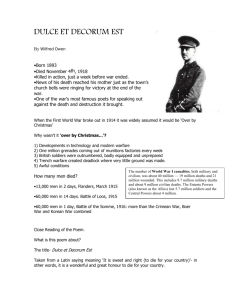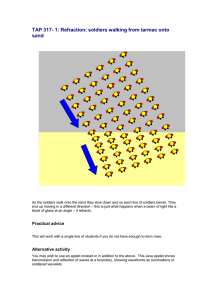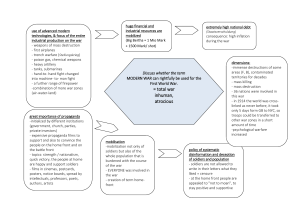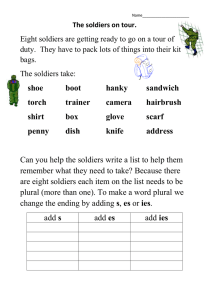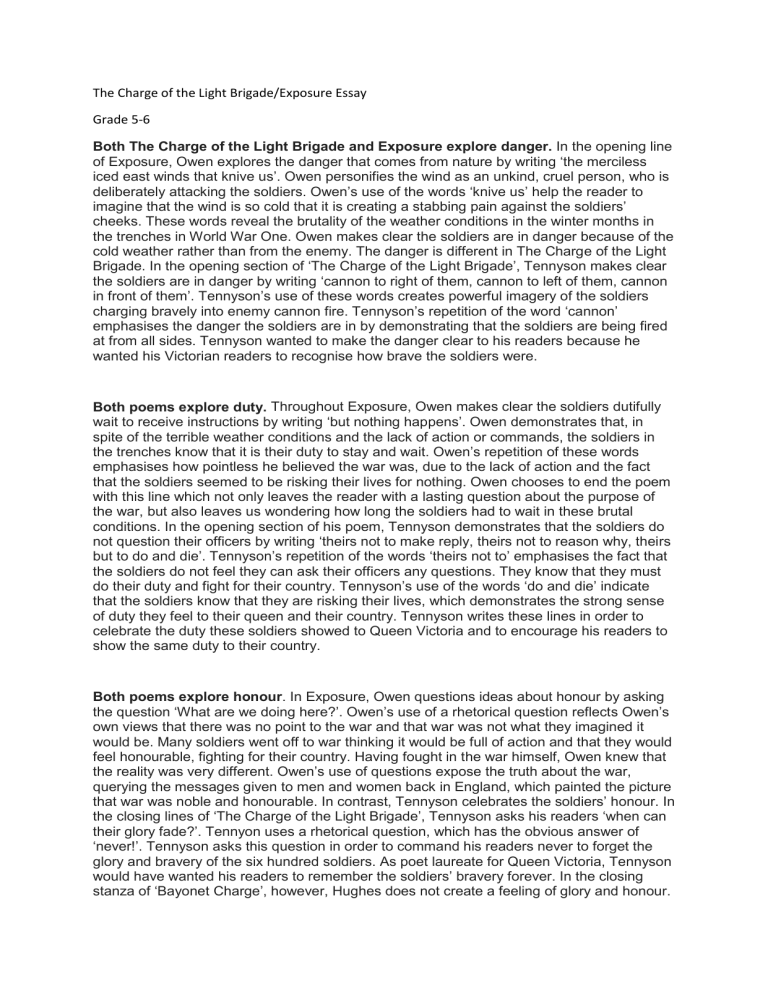
The Charge of the Light Brigade/Exposure Essay Grade 5-6 Both The Charge of the Light Brigade and Exposure explore danger. In the opening line of Exposure, Owen explores the danger that comes from nature by writing ‘the merciless iced east winds that knive us’. Owen personifies the wind as an unkind, cruel person, who is deliberately attacking the soldiers. Owen’s use of the words ‘knive us’ help the reader to imagine that the wind is so cold that it is creating a stabbing pain against the soldiers’ cheeks. These words reveal the brutality of the weather conditions in the winter months in the trenches in World War One. Owen makes clear the soldiers are in danger because of the cold weather rather than from the enemy. The danger is different in The Charge of the Light Brigade. In the opening section of ‘The Charge of the Light Brigade’, Tennyson makes clear the soldiers are in danger by writing ‘cannon to right of them, cannon to left of them, cannon in front of them’. Tennyson’s use of these words creates powerful imagery of the soldiers charging bravely into enemy cannon fire. Tennyson’s repetition of the word ‘cannon’ emphasises the danger the soldiers are in by demonstrating that the soldiers are being fired at from all sides. Tennyson wanted to make the danger clear to his readers because he wanted his Victorian readers to recognise how brave the soldiers were. Both poems explore duty. Throughout Exposure, Owen makes clear the soldiers dutifully wait to receive instructions by writing ‘but nothing happens’. Owen demonstrates that, in spite of the terrible weather conditions and the lack of action or commands, the soldiers in the trenches know that it is their duty to stay and wait. Owen’s repetition of these words emphasises how pointless he believed the war was, due to the lack of action and the fact that the soldiers seemed to be risking their lives for nothing. Owen chooses to end the poem with this line which not only leaves the reader with a lasting question about the purpose of the war, but also leaves us wondering how long the soldiers had to wait in these brutal conditions. In the opening section of his poem, Tennyson demonstrates that the soldiers do not question their officers by writing ‘theirs not to make reply, theirs not to reason why, theirs but to do and die’. Tennyson’s repetition of the words ‘theirs not to’ emphasises the fact that the soldiers do not feel they can ask their officers any questions. They know that they must do their duty and fight for their country. Tennyson’s use of the words ‘do and die’ indicate that the soldiers know that they are risking their lives, which demonstrates the strong sense of duty they feel to their queen and their country. Tennyson writes these lines in order to celebrate the duty these soldiers showed to Queen Victoria and to encourage his readers to show the same duty to their country. Both poems explore honour. In Exposure, Owen questions ideas about honour by asking the question ‘What are we doing here?’. Owen’s use of a rhetorical question reflects Owen’s own views that there was no point to the war and that war was not what they imagined it would be. Many soldiers went off to war thinking it would be full of action and that they would feel honourable, fighting for their country. Having fought in the war himself, Owen knew that the reality was very different. Owen’s use of questions expose the truth about the war, querying the messages given to men and women back in England, which painted the picture that war was noble and honourable. In contrast, Tennyson celebrates the soldiers’ honour. In the closing lines of ‘The Charge of the Light Brigade’, Tennyson asks his readers ‘when can their glory fade?’. Tennyon uses a rhetorical question, which has the obvious answer of ‘never!’. Tennyson asks this question in order to command his readers never to forget the glory and bravery of the six hundred soldiers. As poet laureate for Queen Victoria, Tennyson would have wanted his readers to remember the soldiers’ bravery forever. In the closing stanza of ‘Bayonet Charge’, however, Hughes does not create a feeling of glory and honour. Grade 8-9 Similar to Owen, Tennyson explores the dangers of war for the British soldiers. In the opening line of Exposure, as the soldiers wait agonisingly for the enemy’s attack, Owen explores the danger that comes from nature by writing ‘the merciless iced east winds that knive us’. Owen personifies the wind as an unsympathetic, cruel person, who is deliberately attacking the soldiers. Owen’s use of the words ‘knive us’ help the reader to vividly imagine that the wind is brutally cold and that it is creating a stabbing pain against the soldiers’ cheeks. Perhaps Owen uses these words as a reflection on his own experience and to reveal to his readers the brutality of the weather conditions during the coldest winter months in the trenches in World War One. As a soldier in the war himself, Owen wanted to make clear that soldiers are in danger because of the cold weather rather than from the fire of the enemy. Although Tennyson also explores the dangers of war, the danger to the British soldiers in ‘The Charge of the Light Brigade’ is from the powerful Russian enemy. Unlike the soldiers in Owen’s ‘Exposure’ who are waiting for action, Tennyson immediately starts his poem with the action of the battle. In the opening section of ‘The Charge of the Light Brigade’, as the British soldiers charge towards their death, Tennyson makes clear the soldiers are in danger by writing ‘cannon to right of them, cannon to left of them, cannon in front of them’. Tennyson’s use of these words creates powerful imagery of the soldiers charging bravely and heroically, into enemy cannon fire. Tennyson’s repetition of the word ‘cannon’ emphasises the danger the soldiers are in by demonstrating that the soldiers are surrounded by enemy gunfire from all sides. Similarly, Tennyson also makes clear to the reader that the British soldiers are severely outnumbered compared to the Russians. As the first war to be reported in the news, many stories were raising criticism of the officers in charge. Tennyson wanted to ensure that the danger was clear to his readers so that his Victorian readers would recognise how brave the soldiers and officers were. Both ‘Charge of the Light Brigade’ and ‘Exposure’ explore how the soldiers obediently fulfilled their duty in war. Throughout Exposure, as the soldiers agonise over when the next enemy attack will be, Owen makes clear the soldiers dutifully wait to receive instructions by repeating ‘but nothing happens’. Owen demonstrates that, in spite of the deathly weather conditions and the lack of action or commands, the soldiers in the trenches know that it is their duty to stay and wait. Owen’s repetition of these words emphasises how futile he believed the war was, due to the lack of enemy fire and the fact that the soldiers seemed to be risking their lives for nothing. Owen chooses to end the poem with this line which not only leaves the reader pondering about the purpose of the war, but also leaves us sympathising with the soldiers who had to endure these brutal conditions for a long time. Similarly, in the opening section of his poem, Tennyson demonstrates that the soldiers obediently follow their officers’ orders by writing ‘theirs not to make reply, theirs not to reason why, theirs but to do and die’. Similar to Owen, Tennyson’s repetition of the words ‘theirs not to’ emphasises the fact that the soldiers feel obliged to follow orders and not contradict their officers. They know that they must do their duty and patriotically fight for their country. Tennyson’s use of alliteration in the words ‘do and die’ indicate that the soldiers know that they are risking their lives, which demonstrates the strong sense of duty they feel to their queen and their country. As Poet Laureate, Tennyson writes these lines not only to encourage his readers to admire the sacrifices the soldiers undertook in their devotion to their country but to also encourage them to show the same level of duty. Both poems explore the honourable actions the soldiers took when sacrificing their lives for their country. In Exposure, as more soldiers die from the unbearably cold weather conditions, Owen questions ideas about honour by asking the question ‘What are we doing here?’. Owen’s use of a rhetorical question reflects Owen’s own views of the futility of war and that war was not what they imagined it would be. Many soldiers enlisted in the war with their minds full of propaganda after being told war would be full of action and that they would feel honourable, fighting for their country. Having fought in the war himself, Owen knew that the reality was very different so he wanted to challenge the patriotic propaganda that was shared on the home front. Owen’s use of questions exposes the truth about the war, querying the messages given to men and women back in England, which painted the picture that war was noble and honourable. In contrast to Owen, Tennyson wanted to ensure that the people at home would celebrate the soldier’s honour. In the closing lines of ‘The Charge of the Light Brigade’, after Tennyson has helped the reader vividly imagine the dangerous position the soldiers were in, Tennyson asks his readers ‘when can their glory fade?’. Tennyson’s use of a rhetorical question, commands his readers never to forget the glory and bravery of the six hundred soldiers. As poet laureate for Queen Victoria, Tennyson would have wanted his readers to remember the soldiers’ valiant sacrifices forever. Both poets wanted to use the structure of their poems to create a controlling and systematic rhythm. In ‘Charge of the Light Brigade’, Tennyson uses a tight rhyme scheme to symbolise the tight and relentless control the officers maintain over the soldiers. The soldiers feel obligated to unquestioningly follow the commands to charge to their deaths. Similarly, Tennyson also uses repetition to reflect the merciless control of the officers. Not only does Tennyson use his rhyme and repetition to clearly convey the harsh and persistent orders the soldiers had to face, he also wanted to create an orderly and repetitive rhythm to make the poem memorable. Tennyson wanted to ensure that his reader’s would remember the soldiers’ dutiful sacrifices in a time of mistaken orders so created a structured poem that the illiterate readers would be able to remember. Similar to this, Tennyson’s use of the ballad form recreated the order of the battle to make the devastating loss of soldiers even more difficult to forget. Similar to Tennyson, Owen also uses a tight structure in ‘Exposure’. The regular five lined stanzas reflect the tight control held over the soldiers. Owen wanted to emphasise to his readers that the soldiers were expected, by their officers, to wait day after day after day in the trenches. Although Owen also wanted his readers to remember his poem, unlike Tennyson, Owen wanted to expose his readers to the brutal reality of war.
